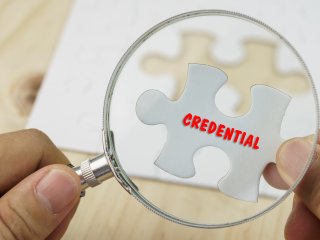Posted August 30th, 2016
By Kris Powers
The demand for alternative credentials is on the rise. To increase their chances of succeeding in today’s ever evolving job market, students of all ages are expressing the desire to quickly close any personal skills gaps and show aptitude in a variety of subject matters. Online MOOC’s, Bootcamps, Certificate Programs and Digital Badge Programs are becoming popular options as they provide students with real-world, relevant skills in a convenient online format. Students select courses in specific areas in which they’d like to gain proficiency, allowing them the opportunity to focus in on a particular competency. Obtaining a certification or credential upon completion of the course signifies to employers that the student has pursued and obtained additional training and knowledge in this specific area.
For many, it is becoming apparent that the current degree system might not meet today’s workforce needs. A degree is just one solution to close the workforce skills gap – alternative credentials offers another. In his book, “College Disrupted: The Great Unbundling of Higher Education,” published last year, Ryan Craig explains the benefits of “unbundling” the higher education degree into shorter, less-expensive credentials. He writes that the ability to earn credentials through blended or online courses offered by colleges, universities and other organizations allows students to determine the best path for obtaining the training they need to gain employment. (1)
President Obama’s challenge to have “every American commit to at least one-year of higher education or post-secondary training” and the Lumina Foundation’s goal for at least 60% of Americans to “obtain a high-quality postsecondary degree or credential by 2025” may have helped raised public awareness and interest in alternative credentialing.
In a recent study conducted by Jim Fong, director of UPCEA’s Center for Research Marketing Strategy; Kyle Peck, director of the Center for Online Innovation in Learning and a professor at Penn State; and Peter Janzow, senior director of business development at Pearson’s Acclaim, 190 institutions were surveyed to determine what role alternative credentials play in higher education. The study found that alternative credentials were offered by 94% of the institutions profiled. (2)
“The degree will always be an important credential, but it won’t always be the gold standard,” said Jim Fong in a prepared statement. “As millennials enter the prime years of their career and move into positions of greater power, we’ll see more alternative credentials for specific industries and possibly across the board. Higher education institutions, especially those in our survey, are showing that they are being progressive with workforce needs.” (4)
Students and professionals alike benefit from the widespread acceptance of assessments and alternative certifications in the workplace. However, there need to be organizations that provide oversight and regulations that result in a standard of excellence, and therefore in the trust in the quality of alternative credentialing.
Third-party credentialing systems currently exist for jobs in the vocation sector such as auto repair, welding and truck driving, as well as in licensed professions such as law and medicine.
The Information Technology and Innovation Foundation think tank feels a similar process should be created for measuring competencies for the “jobs of the future, including those requiring the skills normally associated with a college diploma.” In a recent report, The ITIF Foundation called for the federal government to encourage the use of standardized assessments to measure postsecondary knowledge and skills by creating a “national network of certified organizations that assess the learning and skills of young people before they enter the workforce.” (3)
To help meet this need, The American Council on Education (ACE) has developed a process to convert learning obtained outside of accredited institutions into learning that is recognized as equivalent to more traditional credit-hour learning through higher education institutions. For example, within ACE, the College Credit Recommendation Service (CREDIT) helps adults get academic credit, whenever possible, for education and training obtained outside the classroom including courses, exams and apprenticeship. In addition, ACE’s Military Programs recommend equivalent college credits for members of the armed forces for certain types of military training and service experiences. (5)
Ed4Career is helping to pave the way of the future! The American Council on Education’s (ACE) College Credit Recommendation Service (ACE CREDIT)® has evaluated and recommended college credit for Ed4Career's courses. For more than 30 years, colleges and universities have trusted ACE CREDIT to provide reliable course equivalency information to facilitate their decisions to award academic credit. Ed4Credit offers a completely affordable opportunity for students to start their evolution through education.
Ed4Career has also long recognized the appeal of certifications to serve learners’ needs and is proud to offer a wide range of courses that prepare the student for certification in their field. Many of our courses in Medical and Healthcare, Business, Sustainability, Coaching and Counseling, Skilled Labor, Creative Careers and IT prepare students to sit for and pass national certification exams. Feel free to visit our website to learn more!
Sources:
(1) https://www.edsurge.com/news/2016-03-31-a-survival-strategy-for-alternative-credential-providers
(2) https://unbound.upcea.edu/innovation/alternative-credentialing/alternative-credentials-new-ways-to-certify-learning/ An infographic of the report’s information is on the Pearson site and the full report is available on the UPCEA site.




